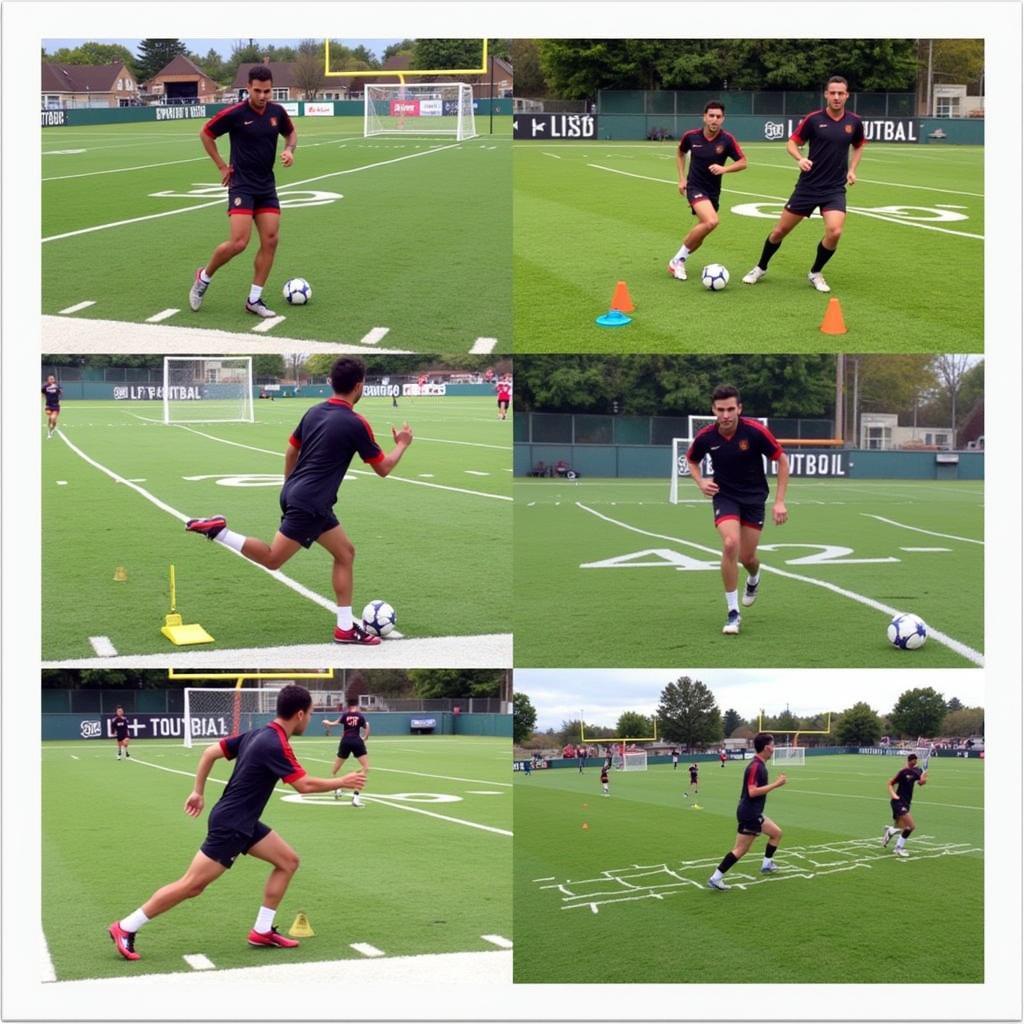How Football Players Run the 100m
January 3, 2025Football players’ 100m times are a fascinating insight into their explosive speed and power, crucial elements for success on the pitch. While not a primary focus of their training, sprinting ability is undeniably linked to their performance in match situations, like chasing down a through-ball or quickly closing down an opponent. This article delves into how football players run the 100m, exploring the factors influencing their speed, training methods, and notable examples of lightning-fast footballers.
The Science Behind a Footballer’s 100m Sprint
A footballer’s 100m time is influenced by a combination of genetics, training, and biomechanics. Factors like muscle fiber composition, stride length, and stride frequency play significant roles. Fast-twitch muscle fibers, responsible for explosive movements, are particularly important for quick acceleration. Training focuses on developing these fibers alongside improving running technique, such as starting stance, arm movement, and maintaining proper form throughout the sprint. While pure speed is important, it’s also crucial to consider how this translates to agility and acceleration on the field, which are often more relevant to game situations.
Training for Speed in Football
Football training incorporates specific drills to enhance speed and acceleration. Plyometrics, like box jumps and bounding exercises, help develop explosive power. Sprint drills over short distances, such as 30m and 40m sprints, are regularly practiced. Resistance training with weights and bands strengthens muscles crucial for powerful strides. Agility drills, incorporating changes in direction and quick movements, mimic the demands of a real match. A footballer’s training program aims to optimize both their top-end speed and their ability to accelerate rapidly within short distances, critical for outpacing opponents and exploiting space on the field.
 Football Speed and Agility Drills
Football Speed and Agility Drills
How do footballers’ 100m times compare to professional sprinters?
While footballers demonstrate impressive speed, their 100m times generally don’t rival those of professional sprinters. Sprinters dedicate their training solely to maximizing straight-line speed, whereas footballers require a broader skill set. Their training must balance speed development with other crucial elements like ball control, passing, and tactical awareness. This difference in training focus explains the disparity in 100m times between the two groups. However, the speed and acceleration of top footballers remain remarkable, often exceeding that of average athletes.
“The key difference lies in specificity of training,” says Dr. James Carter, a sports physiologist specializing in athlete performance. “Sprinters are trained to optimize every aspect of their 100m performance, while footballers need to be versatile athletes.”
Famous Footballers Known for Their Speed
Several footballers have gained recognition for their blazing speed. Players like Kylian Mbappé, Adama Traoré, and Alphonso Davies are known for their blistering pace, capable of leaving defenders in their dust. Their speed is a significant asset, allowing them to break through defensive lines, create scoring opportunities, and effectively track back on defense. These players exemplify how speed can be a game-changer in football, giving them a decisive edge over their opponents.
Conclusion
Understanding how football players run the 100m provides valuable insight into the importance of speed in the sport. While not the sole determinant of success, speed, combined with agility and acceleration, is a crucial attribute for modern footballers. Dedicated training programs, focused on developing explosive power and refining running technique, allow players to maximize their speed potential, giving them a significant advantage on the pitch. So, while football players may not be breaking world records in the 100m, their speed remains a defining characteristic of their athleticism and a key contributor to their performance in the beautiful game.
FAQ
-
What is the average 100m time for a professional footballer? The average varies widely, but typically falls between 11 and 12 seconds.
-
Do footballers train specifically for the 100m? No, their training focuses on football-specific speed and agility, which translates to performance on the field.
-
Who is considered the fastest footballer in the world? This is debatable, but players like Kylian Mbappé often top the list.
-
How does speed impact a footballer’s performance? Speed allows players to outrun opponents, create scoring chances, and track back effectively on defense.
-
What are some key exercises for improving football speed? Plyometrics, sprint drills, and agility training are crucial for developing speed.
-
Is genetics a factor in a footballer’s speed? Yes, genetic factors like muscle fiber composition play a significant role.
-
How is speed measured in football? While 100m times can be a reference, in-game speed and acceleration are often more relevant.
Need support? Contact us at Phone: 0396443476, Email: [email protected] or visit us at 23 Tháng 3, Đắk Nia, Gia Nghĩa, Đắk Nông, Việt Nam. We have a 24/7 customer service team.